If you are a PhD student or academic and if you would like to visit us and spend some time at Lancaster, just get in touch. We are happy to host visitors for different periods of time.. from a few weeks to six months or more.
If you are a PhD student, you will have to pay fees but in exchange you get full supervision, use of all facilities and the right to take part in courses etc. If you are a visiting academic you have to pay a ‘bench fee’ of £50 per week, which entitles you to the use of all facilities, a space in a room, IT support etc.
If you want to visit just get in touch and we’ll tell you more.
E.Shove@lancaster.ac.uk
Previous visitors
Sonja Schönberg – Autumn 2024 from Bern University of Applied Science, Switzerland.
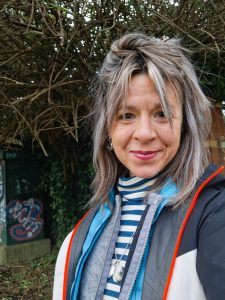
Are you thinking about visiting the Lancaster Centre for Practice Theory? My recommendation: Stop thinking and just do it!
I am Sonja, a PhD student in Switzerland and a newcomer both to Theories of Practice and to what I learned to think of as the Sociological Imagination. In autumn 2024 I had the fantastic opportunity to spend three months in Lancaster, and I would definitely do it again! Here are the three main reasons why:
My Stay at the Lancaster Centre for Practice Theory
- Provided me with a unique opportunity to receive direct feedback on my writing from Practice Theory experts whose work I admire. Elizabeth and Stanley masterfully balance structured guidance with space for open-ended exploration. Every two weeks, they both challenged and encouraged me, pushing me beyond my comfort zone—something I now recognize as an essential part of my learning process.
- Opened up exciting and valuable ‘side avenues.’ I learned strategies to develop a sustainable writing routine, had countless opportunities to engage with scholars in the Department of Sociology on the questions that mattered most to me and thanks to the Learning Development team at the Faculty of Arts and Social Sciences (FASS), I improved my written and spoken English and received targeted feedback from fellow PhD students.
- Enabled me to refine my research focus, transforming a vague idea for my PhD into an early draft of my first academic publication. In just three months at Lancaster, I made more progress on my dissertation than I had in the previous two years.Lancaster gave me the space to disconnect and reconnect. I had never experienced so much uninterrupted time to read, and throughout my stay, I felt incredibly supported—both by the university community and the welcoming locals. It was easy to strike up conversations with strangers in coffee shops, and I was always met with openness, friendliness, and genuine curiosity.
If you’re now thinking, “That’s it, I’m doing this!”—that’s fantastic! Here are a few tips to help you plan your stay and make the most of your time in Lancaster:
- Visit in spring or summer if you can. The days are longer, the region is easier to explore, and you won’t need as much rain gear. 😉
- Stay for at least three months, or longer if possible. Time flies! After three months, you’ll know the campus and surroundings, have had your first floorball experiences, and conversations in English will flow more naturally—you’ll be in the ‘Lancaster flow’… and it’s great to keep that momentum going.
- Connect with the Learning Development team at FASS. It’s an amazing community offering expert and peer support for academic writing, English language development, and many other useful resources.
- If on-campus housing isn’t available, reach out to the teaching coordinators at the Department of Sociology. They’re incredibly helpful—I found a lovely sublet in a small house near the university through them.
- Get a bike (and a helmet!) through the university. It’s an affordable and flexible way to explore the area.
- In the city center: Try breakfast at The Brew, enjoy a meal at Herbarium, and catch a film at The Dukes cinema.
- Go for a hike in the Lake District. The 555 bus takes you from Lancaster City Centre to Grasmere for just £2.
- Visit Edinburgh. (And don’t forget to check train departure times regularly, as schedules often change!) Climb the hills in Holyrood Park for breathtaking views, and for the full authentic experience, try Haggis and Sticky toffee pudding. 😊
If this sounds interesting but you’d like to chat with someone before making the leap, feel free to reach out—I’d be happy to set up a video call!
Like so many visitors before me, I look back on my time in Lancaster with immense gratitude. It was an incredibly enriching experience, both personally and academically, and I couldn’t be more excited for anyone embarking on the same journey—to Lancaster itself and into the vibrant community of Practice Theory Enthusiasts!
Lukas Schmitz – Spring 2024, from the University of Dresden, Germany.

Fantastic Time as a Visiting Researcher at Lancaster University!
Rating: ★★★★★
I spent 2.5 months as a Visiting Researcher at Lancaster University, and I am truly grateful for this experience!
Campus and Surroundings:
The campus is located outside the city and forms its own little universe with shopping options, restaurants and canteens, cafés, sports facilities, and a vibrant student culture. The individual colleges on campus have spacious common rooms where you can gather during the day for studying and working, and in the evenings for social activities. There are accessible places to work all around campus, and the well-stocked library is open 24/7, with a dedicated workspace for postgraduates (where it is REALLY quiet). Its location in a rural area means there are few distractions, and the short distances on campus make Lancaster University an optimal place to work.
Accommodation:
I stayed at the Graduate College directly on campus – although the accommodation was quite basic overall, I highly recommend it: the communal living arrangement allows you to quickly connect with other students, providing plenty of opportunities for interaction. The social hubs frequently host events, ranging from academic discussions about research projects to joint excursions into the surrounding countryside. However, since spaces are quickly filled, I recommend organising accommodation early during the preparation for your stay!
Research Opportunities and Support:
I was warmly welcomed by the department and received more support than I could have wished for, from being provided with a workspace in a shared office to having access to the well-stocked library, diverse contacts through workshops, seminars, and conferences, and assistance from the staff to engaging conversations with friendly colleagues. In particular, the guidance from my two supervisors, Elizabeth Shove and Stanley Blue, with whom I had regular discussions about my progress and whose appreciative and challenging perspectives I am very grateful for, has significantly advanced my work. The department also offers many opportunities to connect, from lectures to collaborative writing groups (a real highlight was the “Intellectual Party”, a PhD conference organised at LU every year, which is highly recommended). But beyond the opportunities for connection and conversation, there is plenty of time to work on your own projects without interruption!
Conclusion:
I am very thankful for my time in Lancaster and look back on it fondly: in this short period, I learnt a lot and had valuable encounters that broadened my personal and academic horizons. I had ample time to delve into questions that often don’t have space in everyday life back home; being able to pursue these questions without disturbance and having the opportunity to discuss them with my supervisors in fortnightly meetings was a wonderful experience. Last but not least, I thoroughly enjoyed campus life. I wholeheartedly recommend a stay in Lancaster!
Andrea Olmos Talonia – Autumn 2023, from the National Polytechnic institute, Mexico.

The opportunity to do a research stay abroad is certainly a dream come true for any student passionate about their field of study. For me, this opportunity materialised in an enriching five-month experience in England, collaborating with two leading experts in the fascinating world of Practice Theory.
Practice Theory, a topic I had only superficially explored in Mexico, became the focus of my daily enquiries and conversations. My hosts, Elizabeth Shove and Stanley Blue, two experts in the field, not only shared their deep knowledge, but also guided me through discussions that revealed to me the conceptual power of this theory. The richness of the talks not only gave me a better understanding of the subject, but also fueled my enthusiasm for research and intellectual exploration.
The academic experience was not the only source of learning. The opportunity to play floorball, a new sport for me, was not only a lot of fun, but also allowed me to build bonds and relationships with my fellow researchers and other team members.
The cultural diversity present in my research environment also enriched my experience. Sharing ideas with people from different cultures not only broadened my academic perspective, but also allowed me to appreciate the richness of diversity and inclusion on a personal level.
Another significant aspect of my stay was the sense of community that developed over the months. The meetings I had with Elizabeth Shove and Stanley Blue to discuss ideas, share advances in my research and engage in academic activities created a collaborative and supportive environment that fostered my personal and academic growth.
In addition to my immersion in research and social interaction, I also had the opportunity to explore British and wider European culture, enjoying its traditions, ways of living and understanding the world, and historical sites. From visiting museums to experiencing local festivals, each experience was an additional learning opportunity and a constant reminder of the cultural richness that exists beyond the academic classroom and my own country.
In retrospect, this research stay in England has been pivotal in my academic and personal development. Through interaction with experts, fellow researchers and the wider community, I have consolidated my academic skills and gained a deeper understanding of my field of study. Practice Theory, once an abstract concept, has now become an intellectual curiosity that will surely guide many of my future academic questions and interests.
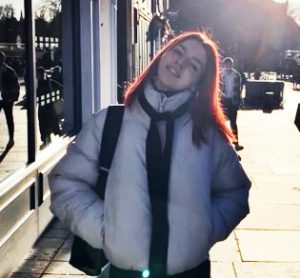
Nina Schlömer, Summer 2023
My decision to visit the Centre for Practice Theory over the summer of 2023 could perhaps be considered an unusual choice for someone that has just started their PhD in Information Systems. From Berlin to Lancaster, from Information Systems to (mostly) Sociology, and from my Master’s studies to a PhD—my stay in Lancaster was a time of change.
During that time, Elizabeth and Stanley as my host supervisors have pushed me to question my taken-for-granted assumptions about the practices of reading and writing and to go beyond the boundaries that I set for myself. While I quickly came to the quite humbling realisation that I probably know less than I had thought, my time in Lancaster has immensely helped me open my mind to completely new research questions and territories. During my stay, I focused particularly on writing a manuscript on ontological questions about ‘the digital’ and how we can grasp its particular nature by centering practices—a manuscript I also got to discuss at the ‘Practice Theory and the Digital’ workshop in September 2023. Elizabeth and Stanley’s comments and insights have immensely helped me in developing this essay which, in one way or another, underlies all of my current research.
Supervised by Elizabeth and Stanley and surrounded by other PhD students and researchers working with practices from different disciplines, I believe that I have grown a lot; and with every month that passes after my stay, I realise how much of my experience while in Lancaster I am still carrying with me. There are, of course, more obvious threads that I have taken up—I am now a proud organising member of the Practice Theory Consortium, taking care of our map and regularly visiting other researchers working with Practice Theory on our virtual boat trips. I have also fallen in love with floorball, and hope to implement it as a practice at my department back home in Berlin once spring comes around. But there are also more subtle threads: I am now much more confident in my writing, more critical in my thinking, and I hope to carry this into my research as well into my teaching back home in Berlin. I could not have asked for a more inspiring experience at the very beginning of my PhD.
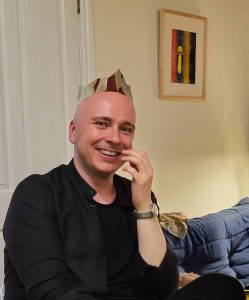
Tapio Reinekoski – Autumn 2022 and Spring 2023
Tapio Reinekoski is a doctoral researcher in sociology at Tampere University, Finland. His PhD project studies knowing in climate change governance and policy in cities in Finland. The project has looked into the knowledge (https://sciencetechnologystudies.journal.fi/article/view/97519) and governance practices (https://journals.sagepub.com/doi/full/10.1177/00380261221123186) of climate work in city organisations and has mostly entailed designing and analysing policymaking exercises run with politicians and experts in different cities. His future work beyond the PhD will also cover insurance and cybersecurity. Bringing all these together is an interest in the ways the contingencies and uncertainties of futures are made do with, prepared for, and governed somehow, and in how different strands of social theory and methodologies can make sense of these efforts.
About the visits to Lancaster
So far, I’ve spent two month-and-a-half periods in Lancaster and the Centre for Practice Theory in autumn 2022 and spring 2023. I made new contacts also with the Climate Citizens group at the Lancaster Environment Centre (LEC). During my stays, I got refreshingly critical yet encouraging feedback from Elizabeth Shove and Stanley Blue to my own articles, both drafts and published, presented in the work-in-progress seminar of LEC scholars, joined the practice theory Reading Rooms, and met with other sociologists to read, talk and cook. Most of the time, however, I managed to treat both my visits as the writing retreats I hoped they would be and finished my solo paper on using the concept of prefigurative politics to encompass and analyse institutional governance and scenario exercising (still in review at the time of writing this), and a group paper on the different modes of preparedness for socio-environmental crises in Finnish public governance organisations (ditto). Being invited to talk about these papers and my other work while in Lancaster really spurred on my thinking and writing.
Beyond academics, I was also impressed by the high standard of floorball maintained by Elizabeth, Stanley, and other Lancaster sociologists. A Finn who spent a large part of his adolescence chasing around the holed white ball was quickly humbled.
My hunch on timing my trips to early autumn and spring turned out to be spot on. The lush greens and the bloom of all other colours around and beyond the city provided the serene surroundings for concentrating, relaxing, and, if only briefly, picking up running again. Lancaster also brought out the beginner birdwatcher in me and especially made me a fan of starlings.
Serge Horbach – April 2019
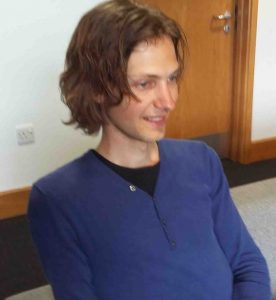
It has been a great pleasure to stay in Lancaster with Elizabeth and her colleagues. Both intellectually and socially I had a great time: being part of reading groups, attending lectures and birthday parties, having film nights together and, most importantly of course, playing floorball, made me feel a genuine part of the team during the weeks I visited them. Having all these formal and more informal interactions has been a very good way of getting to know new people, their ideas and their work.
This has sparked some new insights for my own work on editorial and peer review practices, which I have increasingly came to look at as wild practices that are (or should be) tamed. The role of power exercised through practices and the influence of infrastructures in providing continuity or stability to practices, thereby potentially hindering change, have also appealed to me.
Add to all of this the great environments surrounding Lancaster, which I enjoyed during my long hikes in the weekends, and it should come as no surprise that I look back upon a very pleasant stay.
Stefan Laube – April 2019
Stef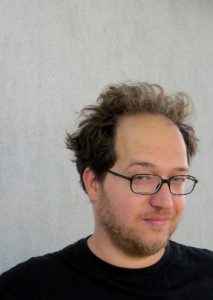 an Laube is a postdoctoral researcher at the Open Topic Post Doc-Program of the Technische Universität Dresden. Among other things, his research interest is on how social practices relate to bodies, technologies and materialities. His recent research is on distributed and mediated practices of writing in politics. Previous work included techno-social practices of market observation in financial trading and the effects of telephone/screen technology for the performance of emotional labor in the call center. Since most of his research involves ethnographic fieldwork, he is also interested in further reflecting and developing ethnographic methodology.
an Laube is a postdoctoral researcher at the Open Topic Post Doc-Program of the Technische Universität Dresden. Among other things, his research interest is on how social practices relate to bodies, technologies and materialities. His recent research is on distributed and mediated practices of writing in politics. Previous work included techno-social practices of market observation in financial trading and the effects of telephone/screen technology for the performance of emotional labor in the call center. Since most of his research involves ethnographic fieldwork, he is also interested in further reflecting and developing ethnographic methodology.
This is what Stefan said about his visit
Visiting Lancaster has been an inspiring experience. I would like to thank Rachel Verrall for introducing me to the campus, and the the people at DEMAND for welcoming me warmly and inviting me to engage with their work. A special thanks goes to Elizabeth Shove and Carolynne Lord for helping me to organize my visit and making it a wonderful experience.
While being in Lancaster, I mainly worked on two things: First, I finished a journal article on the sociomateriality of adapting contents in political campaign work, which will appear in Media, Culture & Society soon. Secondly, I worked on a research proposal concerned with the contribution of various kinds of expertise in the making of migration politics. Most of my working hours consisted in trying to conceptualize in/visibility as an integral part of making political contents. Taking part in the “Connecting Practices”-event organized by the DEMAND centre as well as in a reading group on ethnography of infrastructure helped me a great deal with that.
What I enjoyed most in Lancaster was the beautiful nature: Walking and cycling at the canal and across the countryside, visiting the close coast at Morecambe, watching sheep, ducks, swans and birds. I also fell in love with the local pubs and their impressive varieties of ales and stouts. By taking part in the weekly matches at the campus, I also got to know an new kind of sport: floorball.
My decision to visit the Centre for Practice Theory over the summer of 2023 could perhaps be considered an unusual choice for someone that has just started their PhD in Information Systems. From Berlin to Lancaster, from Information Systems to (mostly) Sociology, and from my Master’s studies to a PhD—my stay in Lancaster was a time of change.
During that time, Elizabeth and Stanley as my host supervisors have pushed me to question my taken-for-granted assumptions about the practices of reading and writing and to go beyond the boundaries that I set for myself. While I quickly came to the quite humbling realisation that I probably know less than I had thought, my time in Lancaster has immensely helped me open my mind to completely new research questions and territories. During my stay, I focused particularly on writing a manuscript on ontological questions about ‘the digital’ and how we can grasp its particular nature by centering practices—a manuscript I also got to discuss at the ‘Practice Theory and the Digital’ workshop in September 2023. Elizabeth and Stanley’s comments and insights have immensely helped me in developing this essay which, in one way or another, underlies all of my current research.
Supervised by Elizabeth and Stanley and surrounded by other PhD students and researchers working with practices from different disciplines, I believe that I have grown a lot; and with every month that passes after my stay, I realise how much of my experience while in Lancaster I am still carrying with me. There are, of course, more obvious threads that I have taken up—I am now a proud organising member of the Practice Theory Consortium, taking care of our map and regularly visiting other researchers working with Practice Theory on our virtual boat trips. I have also fallen in love with floorball, and hope to implement it as a practice at my department back home in Berlin once spring comes around. But there are also more subtle threads: I am now much more confident in my writing, more critical in my thinking, and I hope to carry this into my research as well into my teaching back home in Berlin. I could not have asked for a more inspiring experience at the very beginning of my PhD.
Nina
